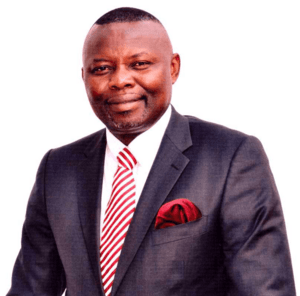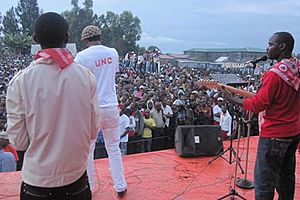Vital Kamerhe facts for kids
Quick facts for kids
His Excellency
Vital Kamerhe
|
|
|---|---|

Kamerhe in 2010
|
|
| President of the National Assembly of the Democratic Republic of the Congo | |
| Assumed office May 24, 2024 |
|
| Preceded by | Christophe Mboso |
| In office December 29, 2006 – March 26, 2009 |
|
| Preceded by | Thomas Luhaka |
| Succeeded by | Evariste Boshab |
| Member of the National Assembly from Bukavu |
|
| Assumed office February 12, 2024 |
|
| In office December 29, 2006 – March 26, 2009 |
|
| Vice Prime Minister, Minister of Economy | |
| Assumed office March 23, 2023 |
|
| Personal details | |
| Born | 4 March 1959 Bukavu, Belgian Congo |
| Political party | Union for the Congolese Nation |
| Spouse | Amida Shatur |
| Residence | Democratic Republic of Congo |
| Website | http://www.vital-kamerhe.com/ |
Vital Kamerhe Lwa Kanyiginyi Nkingi, born on March 4, 1959, is an important politician and economist from the Democratic Republic of the Congo. He is currently serving as the Deputy Prime Minister of Economy. He also leads a political group called the Union for the Congolese Nation (UNC).
Mr. Kamerhe was the President of the National Assembly of the Democratic Republic of the Congo from 2006 to 2009. After leaving that role, he started the UNC party. He ran for president in 2011. Later, he worked with Félix Tshisekedi during the 2018 presidential election. When Mr. Tshisekedi became president, Vital Kamerhe became his chief of staff.
In 2020, Mr. Kamerhe faced legal issues concerning money for public projects. He was found guilty but later won his appeal in 2022. After this, he returned to the government in 2023. He became the Deputy Prime Minister in charge of the economy. In May 2024, he was again chosen to be the President of the National Assembly.
About Vital Kamerhe
His Early Life and Schooling
Vital Kamerhe was born in Bukavu, Sud-Kivu, on March 4, 1959. His parents were Constantin Kamerhe Kanyginyi and Alphonsine Mwa Nkingi. His family comes from the Shi community in the Walungu area. He is married and has nine children.
He started primary school in Bukavu and then moved to Goma. He finished primary school in Gandajika, in the Kasai-Oriental region. For high school, he attended Institut Sadisana in Kikwit Sacré-Coeur. He then moved to Kananga and later to Mbuji-Mayi. He earned his State degree in 1980 from Institut Mulemba. Living in different parts of Congo helped him learn four national languages: Kikongo, Lingala, Kiswahili, and Tshiluba. He also speaks French very well.
After high school, he studied at the University of Kinshasa. He earned a degree in Economics in 1987 with high honors. He then worked there as a teaching assistant.
His Journey in Politics
Starting in Politics
Vital Kamerhe began his political journey in 1984. He joined the Union for Democracy and Social Progress (UDPS) party. During a time of political change under Mobutu Sese Seko, he was part of a group called Rassemblement des forces Sociales et Federalistes (RSF). He also led the youth group of the Sacred Union of the Radical Opposition and Allies.
Between 1993 and 1995, he held several government jobs:
- In 1993, he was a director in the Ministry of Environment, Tourism, and Nature Conservation.
- In 1994, he helped coordinate the Prime Minister's office.
- From 1994 to 1995, he was a director for the Minister of Higher Education and University.
Working with Laurent Kabila
Vital Kamerhe continued to serve in government roles. From 2000, he was a deputy commissioner-general for matters related to MONUSCO.
Helping with Peace in the Great Lakes
As the Commissioner General for monitoring the peace process in the African Great Lakes region, he played a key role. He was one of the main people who helped negotiate the 2002 peace agreement.
Role in the 2006 Election
On July 1, 2004, he started leading the PPRD party. He also managed Joseph Kabila's campaign for president in the 2006 Democratic Republic of the Congo general election. In 2006, he was elected as a representative for South Kivu in the National Assembly. He served as the President of the National Assembly until March 26, 2009.
As President of the National Assembly
In 2009, while he was President of the National Assembly, he questioned the government. He was concerned about military operations that allowed Rwandan troops into Congo without telling the parliament. This went against the country's constitution.
On March 25, 2009, he gave a speech and resigned from his position. On December 14, 2010, Kamerhe officially left the PPRD party. He announced he would run for president in the 2011 Democratic Republic of the Congo general election. He also created his new party, the UNC. The UNC officially started in February 2011. In the 2011 election, Kamerhe received 7.74% of the votes.
On April 23, 2024, Vital Kamerhe was chosen as the candidate for president of the Assembly by the “Sacred Union” group. He was elected to this role on May 22, 2024.
Working with Félix Tshisekedi
Role in the 2018 Election
In the 2018 Democratic Republic of the Congo general election, Kamerhe supported Félix Tshisekedi, the leader of the UDPS party. The UDPS and UNC formed a group called the Heading for Change coalition. They agreed that if Tshisekedi won, Kamerhe would become his prime minister. Tshisekedi did become president. However, because of how parliament was set up, it was not possible for Kamerhe to become prime minister. Instead, Tshisekedi made Kamerhe his chief of staff. This was one of the first important jobs Tshisekedi filled.
Legal Challenges and Return to Government
On April 8, 2020, Vital Kamerhe was arrested. He faced questions about how money for building projects was used. This event was very unusual for a high-ranking politician in Congo. On June 20, 2020, he was found guilty of misusing funds. He was sentenced to twenty years of forced labor. He was also not allowed to vote or hold public office for ten years. Other people involved also received sentences.
Mr. Kamerhe appealed his conviction. His brother-in-law, Aimé Boji, who is also the secretary general of the UNC, believed the case was politically motivated. On June 18, 2021, a court upheld his conviction but reduced his sentence. In December 2021, he was released from prison temporarily. This was because his health was not good, and he needed medical care while waiting for a second appeal. On June 23, 2022, in a second appeal, the court found him not guilty. The court said there was not enough evidence to prove the charges.
On March 25, 2023, Félix Tshisekedi reappointed Vital Kamerhe to his government. This time, he became the vice prime minister in charge of the economy. On May 22, 2024, he was again elected as the Speaker of the National Assembly. He officially started this role on May 24.
Family Life
Vital Kamerhe is the brother-in-law of Aimé Boji. He married Amida Shatur on February 19, 2019.
 | Jessica Watkins |
 | Robert Henry Lawrence Jr. |
 | Mae Jemison |
 | Sian Proctor |
 | Guion Bluford |


